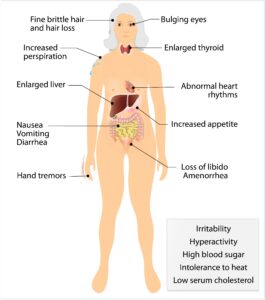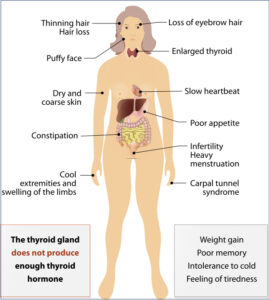The thyroid gland, located in the neck, is responsible for producing hormones that regulate metabolism and energy levels in the body. When the thyroid gland produces too many or too few hormones, it can lead to an overactive or underactive thyroid, respectively. These conditions can cause a range of symptoms that can impact a person’s health and well-being. In this blog post, we’ll explore the symptoms of an overactive or underactive thyroid and how to manage these conditions.
Symptoms of an overactive thyroid
An overactive thyroid, also known as hyperthyroidism, occurs when the thyroid gland produces too much thyroid hormone. Some common symptoms of an overactive thyroid include:
- Rapid heartbeat: An overactive thyroid can cause the heart to beat faster than normal:
- Weight loss: People with an overactive thyroid may lose weight even if they are eating the same amount of food
- Anxiety and restlessness: The extra thyroid hormone can cause feelings of anxiety and restlessness
- Increased appetite: Despite weight loss, people with an overactive thyroid may have an increased appetite
- Muscle weakness: An overactive thyroid can cause muscle weakness, especially in the thighs and upper arms
- Sweating and heat intolerance: People with an overactive thyroid may experience excessive sweating and have difficulty tolerating heat
- Mood swings: The extra thyroid hormone can cause mood swings, irritability, and difficulty concentrating
Symptoms of an underactive thyroid
An underactive thyroid, also known as hypothyroidism, occurs when the thyroid gland doesn’t produce enough thyroid hormone. Some common symptoms of an underactive thyroid include:
- Fatigue: People with an underactive thyroid may feel tired and lethargic, even with plenty of sleep.
- Weight gain: An underactive thyroid can cause weight gain, even with a reduced calorie diet.
- Cold intolerance: People with an underactive thyroid may feel cold all the time, even in warm environments.
- Dry skin and hair: An underactive thyroid can cause dry skin and hair, as well as brittle nails.
- Constipation: An underactive thyroid can cause constipation due to a slower metabolism.
- Depression: People with an underactive thyroid may experience depression, anxiety, and difficulty concentrating.
Managing an overactive or underactive thyroid
If you are experiencing any of the symptoms mentioned above, it’s important to consult a healthcare professional. A doctor can diagnose an overactive or underactive thyroid through a blood test and prescribe medication to regulate the thyroid hormone levels.
In conclusion, an overactive or underactive thyroid can cause a range of symptoms that can impact a person’s health and well-being. If you are experiencing any of the symptoms mentioned above, it’s important to consult a healthcare professional. With proper diagnosis and management, it is possible to manage an overactive or underactive thyroid and improve quality of life.

